高中英语名词性从句讲教案人教版必修三
- 格式:doc
- 大小:109.00 KB
- 文档页数:15

高中名词性从句教案一、教学目标1. 让学生理解名词性从句的概念和用法。
2. 培养学生正确运用名词性从句进行表达的能力。
3. 提高学生对英语语法的综合运用能力。
二、教学内容1. 名词性从句的定义和分类。
2. 名词性从句的连接词。
3. 名词性从句的句子结构。
4. 名词性从句在句子中的功能和位置。
5. 名词性从句的例句分析和练习。
三、教学重点与难点1. 名词性从句的连接词的识别和运用。
2. 名词性从句的句子结构和语序。
3. 名词性从句在句子中的功能和位置的判断。
四、教学方法1. 采用讲授法,讲解名词性从句的概念、分类、连接词、句子结构和功能。
2. 采用案例分析法,分析名词性从句的例句,让学生直观地理解并掌握知识点。
3. 采用练习法,让学生通过练习巩固所学内容。
五、教学步骤1. 引入名词性从句的概念,让学生了解名词性从句的定义和作用。
2. 讲解名词性从句的分类,让学生掌握不同类型名词性从句的用法。
3. 介绍名词性从句的连接词,让学生识别并正确使用连接词。
4. 分析名词性从句的句子结构,让学生了解名词性从句的组成和语序。
5. 讲解名词性从句在句子中的功能和位置,让学生能够判断并运用名词性从句。
6. 提供名词性从句的例句,让学生通过分析例句加深对名词性从句的理解。
7. 设计练习题,让学生运用所学知识进行实践,巩固提高。
8. 总结本节课内容,让学生梳理知识点,加深记忆。
9. 布置作业,让学生进一步巩固所学知识。
10. 课后反思,针对学生的掌握情况,调整教学策略,为下一节课做好准备。
六、教学延伸1. 引导学生运用名词性从句进行写作练习,提高写作水平。
2. 让学生通过课外阅读,积累更多的名词性从句例句,加深对名词性从句的理解。
3. 组织课堂讨论,让学生分享自己在学习中遇到的名词性从句问题,互相解答和探讨。
七、教学评价1. 通过课堂提问,检查学生对名词性从句概念的理解程度。
2. 通过练习题,评估学生对名词性从句的运用能力。

高中英语名词性从句一、教学目标:1. 让学生理解名词性从句的概念和作用。
2. 让学生掌握引导名词性从句的词,如that, which, who, what等。
3. 培养学生正确运用名词性从句进行口语表达和写作的能力。
二、教学内容:1. 名词性从句的定义和分类。
2. 引导名词性从句的词及其用法。
3. 名词性从句在句子中的作用。
三、教学重点与难点:1. 教学重点:名词性从句的概念、分类和引导词的用法。
2. 教学难点:名词性从句在句子中的作用和灵活运用。
四、教学方法:1. 采用案例分析法,通过实例讲解名词性从句的用法。
2. 采用互动教学法,引导学生参与课堂讨论,提高口语表达能力。
3. 采用练习法,让学生通过练习巩固所学知识。
五、教学步骤:1. 引入名词性从句的概念,让学生初步了解。
2. 讲解引导名词性从句的词,如that, which, who, what等,并通过实例进行分析。
3. 讲解名词性从句的分类,如宾语从句、表语从句、同位语从句等,并通过实例进行分析。
4. 讲解名词性从句在句子中的作用,如提供信息、引导句子等。
5. 进行课堂练习,让学生运用所学知识进行口语表达和写作。
6. 总结本节课所学内容,布置课后作业,巩固所学知识。
六、教学评价:1. 课堂参与度:观察学生在课堂讨论中的积极性,以及他们对名词性从句的理解程度。
2. 练习完成情况:检查学生完成练习的情况,评估他们对名词性从句用法的掌握程度。
3. 课后作业:评估学生课后作业的完成质量,检查他们对课堂所学知识的巩固情况。
七、教学资源:1. 教学PPT:展示名词性从句的定义、分类和引导词等知识点。
2. 案例分析:提供实例,让学生更好地理解名词性从句的用法。
3. 练习题:设计练习题,帮助学生巩固所学知识。
八、教学拓展:1. 引导学生了解其他类型的从句,如定语从句、状语从句等,以便学生能够更好地理解英语句子的结构。
2. 组织英语角活动,让学生在实际交流中运用名词性从句,提高口语表达能力。
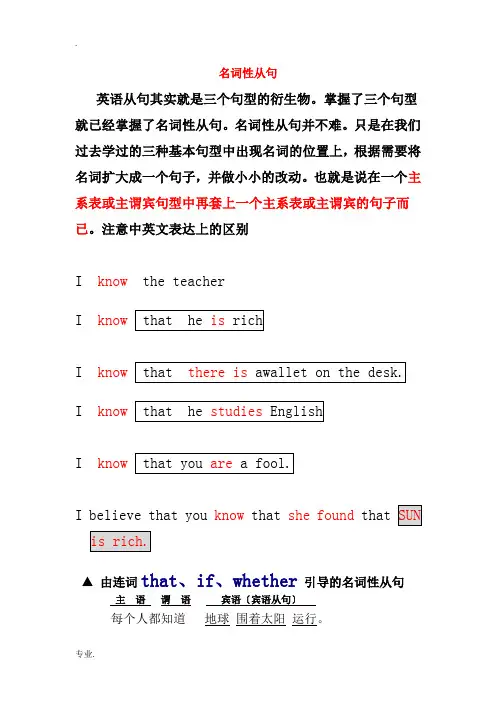
名词性从句英语从句其实就是三个句型的衍生物。
掌握了三个句型就已经掌握了名词性从句。
名词性从句并不难。
只是在我们过去学过的三种基本句型中出现名词的位置上,根据需要将名词扩大成一个句子,并做小小的改动。
也就是说在一个主系表或主谓宾句型中再套上一个主系表或主谓宾的句子而已。
注意中英文表达上的区别I know the teacherI knowIIII believe that you know that she found that▲由连词that、if、whether引导的名词性从句主语谓语宾语〔宾语从句〕每个人都知道地球围着太阳运行。
主语状语谓语主语谓语宾语〔宾语从句〕●Everyone knows连词主语谓语状语从上面的例句可以看出,宾语从句只是将宾语扩大成一个句子,并用连词 that 引导。
因为 that 没有实际意思,通常可以省略。
主语〔主语从句〕系表语地球围着太阳运行是一条真理。
主语〔主语从句〕系表语●形式主语系表语主语〔主语从句〕● It is a truth同样的一个句子,当把它放在主语的位置时,我们便称其为主语从句。
通常将主语从句放在句子的后面,并用 it 代替其原先的位置,叫做形式主语。
在这种情况下,连词 that 通常不省。
主语系● My idea is我的意思是星期天我们去长城。
从上面的句子可以看出将一个完整的句子置于表语的位置,便称作表语从句。
主语从句、表语从句以及宾语从句在句子中所占的位置是名词的位置,所以称它们为名词性从句。
由连词if、whether引导的名词性从句也是完整的句子,所不同的是 that 在句子中没有实际意思,可以省略,而 if、whether因为有是否的意思,故不可省略。
●●I wonder形式主语系表语主语从句注:whether可加or not而if 不能。
有时我们可以将由whether引导的主语从句放在句首,if那么不能。
●found●不要忘了,世界上最强大的力量是爱情。
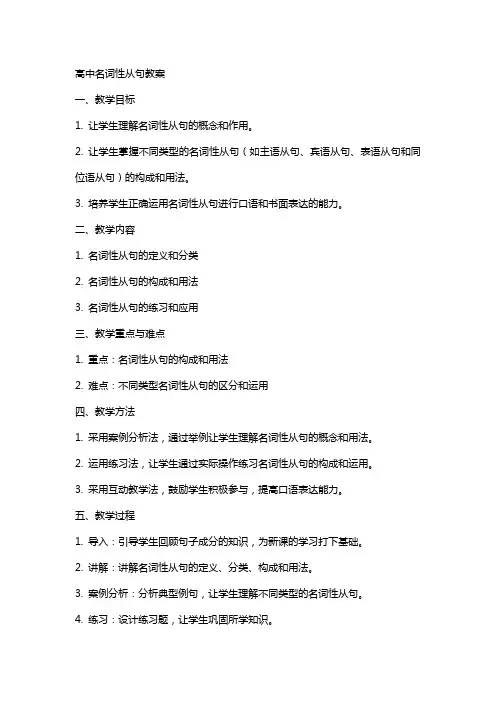
高中名词性从句教案一、教学目标1. 让学生理解名词性从句的概念和作用。
2. 让学生掌握不同类型的名词性从句(如主语从句、宾语从句、表语从句和同位语从句)的构成和用法。
3. 培养学生正确运用名词性从句进行口语和书面表达的能力。
二、教学内容1. 名词性从句的定义和分类2. 名词性从句的构成和用法3. 名词性从句的练习和应用三、教学重点与难点1. 重点:名词性从句的构成和用法2. 难点:不同类型名词性从句的区分和运用四、教学方法1. 采用案例分析法,通过举例让学生理解名词性从句的概念和用法。
2. 运用练习法,让学生通过实际操作练习名词性从句的构成和运用。
3. 采用互动教学法,鼓励学生积极参与,提高口语表达能力。
五、教学过程1. 导入:引导学生回顾句子成分的知识,为新课的学习打下基础。
2. 讲解:讲解名词性从句的定义、分类、构成和用法。
3. 案例分析:分析典型例句,让学生理解不同类型的名词性从句。
4. 练习:设计练习题,让学生巩固所学知识。
5. 互动教学:组织小组讨论,让学生运用名词性从句进行口语表达。
6. 总结:对本节课的内容进行总结,强调重点和难点。
7. 作业布置:布置课后作业,巩固所学知识。
六、教学评价1. 课后作业:布置有关名词性从句的练习题,要求学生在课后进行复习和巩固。
2. 课堂练习:在课堂上进行名词性从句的练习,观察学生的掌握情况。
3. 口语表达:在课堂上提供机会让学生运用名词性从句进行口语表达,评估其应用能力。
4. 小组讨论:评估学生在小组讨论中的表现,了解他们对于名词性从句的理解和运用程度。
七、教学拓展1. 对比分析:引导学生比较名词性从句和其他从句(如定语从句、状语从句等)的异同。
2. 实际应用:让学生收集生活中的名词性从句实例,加深对名词性从句的理解。
3. 相关语法:介绍与名词性从句相关的语法知识,如虚拟语气、倒装等。
八、教学资源1. 教材:选用适合高中生的英语教材,如《新概念英语》、《英语语法大全》等。

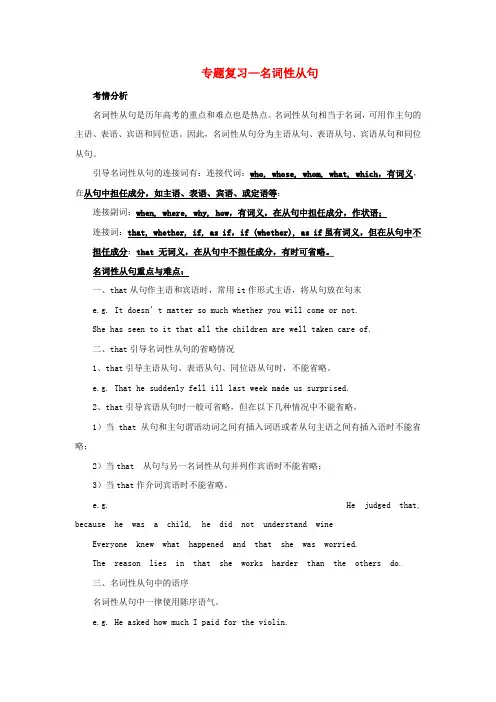
专题复习—名词性从句考情分析名词性从句是历年高考的重点和难点也是热点。
名词性从句相当于名词,可用作主句的主语、表语、宾语和同位语。
因此,名词性从句分为主语从句、表语从句、宾语从句和同位从句。
引导名词性从句的连接词有:连接代词:who, whose, whom, what, which,有词义,在从句中担任成分,如主语、表语、宾语、或定语等;连接副词:when, where, why, how,有词义,在从句中担任成分,作状语;连接词:that, whether, if, as if,if (whether), as if虽有词义,但在从句中不担任成分;that 无词义,在从句中不担任成分,有时可省略。
名词性从句重点与难点:一、that从句作主语和宾语时,常用it作形式主语,将从句放在句末e.g. It doesn’t matter so much whether you will come or not.She has seen to it that all the children are well taken care of.二、that引导名词性从句的省略情况1、that引导主语从句、表语从句、同位语从句时,不能省略。
e.g. That he suddenly fell ill last week made us surprised.2、that引导宾语从句时一般可省略,但在以下几种情况中不能省略。
1)当that从句和主句谓语动词之间有插入词语或者从句主语之间有插入语时不能省略;2)当that 从句与另一名词性从句并列作宾语时不能省略;3)当that作介词宾语时不能省略。
e.g. He judged that, because he was a child, he did not understand wineEveryone knew what happened and that she was worried.The reason lies in that she works harder than the others do.三、名词性从句中的语序名词性从句中一律使用陈序语气。
![人教新课标必修三英语语法-名词性从句[教学课件]](https://uimg.taocdn.com/9adb13848762caaedd33d453.webp)
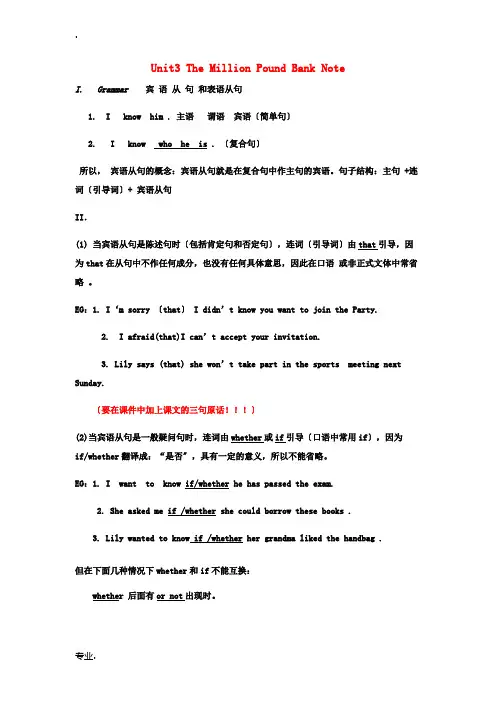
Unit3 The Million Pound Bank NoteI. Grammar宾语从句和表语从句1. I know him .主语谓语宾语〔简单句〕2. I know who he is . 〔复合句〕所以,宾语从句的概念:宾语从句就是在复合句中作主句的宾语。
句子结构:主句 +连词〔引导词〕+ 宾语从句II.(1) 当宾语从句是陈述句时〔包括肯定句和否定句〕,连词〔引导词〕由that引导,因为that在从句中不作任何成分,也没有任何具体意思,因此在口语或非正式文体中常省略。
EG:1. I‘m sorry 〔that〕I didn’t know you want to join the Party.2. I afraid(that)I can’t accept your invitation.3. Lily says (that) she won’t take part in the sports meeting nextSunday.〔要在课件中加上课文的三句原话!!!〕(2)当宾语从句是一般疑问句时,连词由whether或if引导〔口语中常用if〕,因为if/whether翻译成:“是否〞,具有一定的意义,所以不能省略。
EG:1. I want to know if/whether he has passed the exam.2. She asked me if /whether she could borrow these books .3.Lily wanted to know if /whether her grandma liked the handbag .但在下面几种情况下whether和if不能互换:whether 后面有or not出现时。
例如:I don’t know whether or not she can arrive on time.我不知道她是否会准时到达。
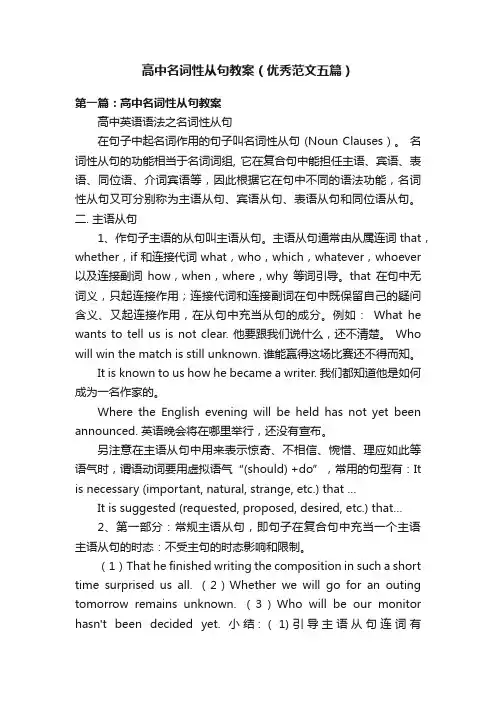
高中名词性从句教案(优秀范文五篇)第一篇:高中名词性从句教案高中英语语法之名词性从句在句子中起名词作用的句子叫名词性从句 (Noun Clauses)。
名词性从句的功能相当于名词词组, 它在复合句中能担任主语、宾语、表语、同位语、介词宾语等,因此根据它在句中不同的语法功能,名词性从句又可分别称为主语从句、宾语从句、表语从句和同位语从句。
二. 主语从句1、作句子主语的从句叫主语从句。
主语从句通常由从属连词that,whether,if和连接代词what,who,which,whatever,whoever 以及连接副词how,when,where,why等词引导。
that在句中无词义,只起连接作用;连接代词和连接副词在句中既保留自己的疑问含义、又起连接作用,在从句中充当从句的成分。
例如:What he wants to tell us is not clear. 他要跟我们说什么,还不清楚。
Who will win the match is still unknown. 谁能赢得这场比赛还不得而知。
It is known to us how he became a writer. 我们都知道他是如何成为一名作家的。
Where the English evening will be held has not yet been announced. 英语晚会将在哪里举行,还没有宣布。
另注意在主语从句中用来表示惊奇、不相信、惋惜、理应如此等语气时,谓语动词要用虚拟语气“(should) +do”,常用的句型有:It is necessary (imp ortant, natural, strange, etc.) that …It is suggested (requested, proposed, desired, etc.) that…2、第一部分:常规主语从句,即句子在复合句中充当一个主语主语从句的时态:不受主句的时态影响和限制。

高中英语《名词性从句》教案导语:名词性从句作为英语语法的重要一部分,在高中英语教学中占据着不可忽视的地位。
它既是从句的一种类型,又是名词的一种用法。
本教案将详细介绍名词性从句的定义、分类以及用法,并给出相关的例句和练习。
一、基本概念名词性从句是在复合句中作主语、宾语、表语、同位语等成分的从句。
二、分类1. 强调句型主语从句、宾语从句、表语从句和同位语从句。
2. 名词性从句的引导词①连接代词:that, whether, what, who, whom, whose, which, whoever, whichever, whatever等。
例如:- I know that he is a doctor.(主语从句)- Can you tell me whether it will rain tomorrow?(宾语从句)②连接副词:how, when, where, why等。
例如:- I don't know how he did it.(宾语从句)- Tell me when you will be back.(宾语从句)三、用法1. 名词性从句作主语主语从句在句中充当主语,常由连接词that引导。
例如:- That he passed the exam is not surprising.(连接词that 引导的主语从句)2. 名词性从句作宾语宾语从句在句中充当宾语,位置一般在及物动词或介词后面。
例如:- She doesn't know where he lives.(连接词where引导的宾语从句)3. 名词性从句作表语表语从句在句中充当表语,常由连接词that引导。
例如:- The important thing is whether he can come to the party.(连接词whether 引导的表语从句)4. 名词性从句作同位语同位语从句在句中充当同位语,通常用that引导。

高一英语人教版必修三名词性从句(一)教学目标1. 知识目标学会归纳和总结名词性从句常用连词,能用所学较熟练的运用于具体语境;2.能力目标能根据需要选择适当的名词性从句常用连词;灵活运用语境找寻规律;3.情感目标(1) 在具体语境中体验运用语法内容,尊重异国语言特点,感悟语言规律美感。
(2) 在小组合作互动中,增强学生的团队合作与分享意识,迎接挑战的决心。
(二)教学重、难点【教学重点】在语境中发现和归纳名词性从句常用连词的具体使用;【教学难点】1.培养学生在英语语境中恰当地使用名词性从句常用连词;2. 通过任务型教学,培养学生的创新精神,实践能力。
(三)教学策略1、让学生参与到课堂教学之中,让学生由被动学习转变为主动学习。
2、主要采用“任务驱动”和“自主观摩”的学习方式,即“确定目标,设计任务;自主探索,积极协作;归纳总结,评价成果”。
3、通过小组合作的教学方式,培养学生自己动手解决问题和交流合作的意识与能力,从而体现新课程的基本理念。
(四)教学过程名词性从句【教师寄语】I think,therefore I am. 我思,故我在。
【课前预习案】1.名词:表示人或事物的名称的词叫名词。
2.名词在句子当中一般可以作什么成分?The boy is li Ming.主语表语Mr. Liang , a 24-year-old boy, teaches us English .主语同位语宾语在英语的句子结构中,本来该由名词充当的主语、宾语、表语和同位语,由一个句子来充当,这个句子就叫名词性从句。
包括: , , , 。
引导名词性从句连接词有:连接词作用 that (本身无词义)whether / if “是否”只起连接词作用,引导从句,在从句中不作 任何成分 who, whom, whose 谁(的)which 哪一个what 什么,所…的事物,东西wh --ever除了起连接词作用外, 在从句中作主语、宾语、表语和定语 when 什么时候,where 什么地方how 怎样、怎么,why 为什么wh --ever , ------除了起连接词作用外,还在从句中作状语名词性从句高考考查主要内容①连接词的选择与判断;①词序:陈述语序;①时态:主从句时态一致 【课中探究案】1. 掌握各种名词性从句的用法。
在句子中起名词作用的从句称为名词性从句。
名词性从句包括主语从句,宾语从句、表语从句和同位语从句。
二、名词性从句的引导词1、连接代词:who, whom, whose, what, which, whoever, whatever等2、连接副词:when, where, why, how3、从属连词: that, whether, if, as if, because (as if, because 只引导表语从句)连接代词和连接副词在句中不再是疑问词,因而从句中用陈述语序。
三、主语从句1、主语从句用连接代词、连接副词和从属连词that,whether引导。
That you don’t like him has nothing to do with me.____________________________________________(约翰是否会做这个实验)remains a question.Who will be sent abroad to further his studies is not announced._____________________________(使我大为惊讶的)was that such a little girl can play the violin so well._________________________________(她是否会告诉我真相)is not known yet.______________________________________________(她如何设法在这么短的时间内完成这篇作文) is still a mystery.2、当主语过长时,常常用it作形式主语,而把真正的主语从句放在主句后面。
常用句型有:1)It +be +形容词(true, possible, certain, likely, surprising, strange,important…)+ that从句It’s certain that she will do well in the exam.It’s likely that he will tell me everything about that night.It’s strange that he should speak to his mother in such a way.2)It +be +名词词组(no wonder, an honor, a pity, high time等)+that 从句It’s a pity that he can’t come.It’s high time that you turned in your homework.3)It +be +过去分词(said, reported, expected, supposed等)+that 从句It’s said that he is quite self-confident.It’s reported that a letter from the university has reached him.4)It +seem/ happen/look as if等+that从句 tIt seems that Alice is not coming.It happened that I was a witness to the accident.5)It +doesn’t matter(make no difference)+wh-It doesn’t matter whether you know my name or not.It makes no difference to me where we shall have the meeting.四、表语从句表语从句用连接代词、连接副词和从属连词that, whether, as if, because引导The impression he makes on me is________________________(他是个可靠的人。
名词性从句英语从句其实就是三个句型的衍生物。
掌握了三个句型就已经掌握了名词性从句。
名词性从句并不难。
只是在我们过去学过的三种基本句型中出现名词的位置上,根据需要将名词扩大成一个句子,并做小小的改动。
也就是说在一个主系表或主谓宾句型中再套上一个主系表或主谓宾的句子而已。
注意中英文表达上的区别I know the teacherI knowIIII believe that you know that she found that▲由连词that、if、whether引导的名词性从句主语谓语宾语(宾语从句)每个人都知道地球围着太阳运行。
主语状语谓语主语谓语宾语(宾语从句)●Everyone knows连词主语谓语状语从上面的例句可以看出,宾语从句只是将宾语扩大成一个句子,并用连词 that 引导。
因为 that 没有实际意思,通常可以省略。
主语(主语从句)系表语地球围着太阳运行是一条真理。
主语(主语从句)系表语●形式主语系表语主语(主语从句)● It is a truth同样的一个句子,当把它放在主语的位置时,我们便称其为主语从句。
通常将主语从句放在句子的后面,并用 it 代替其原先的位置,叫做形式主语。
在这种情况下,连词 that 通常不省。
主语系● My idea is我的意思是星期天我们去长城。
从上面的句子可以看出将一个完整的句子置于表语的位置,便称作表语从句。
主语从句、表语从句以及宾语从句在句子中所占的位置是名词的位置,所以称它们为名词性从句。
由连词if、whether引导的名词性从句也是完整的句子,所不同的是 that 在句子中没有实际意思,可以省略,而 if、whether因为有是否的意思,故不可省略。
●●I wonder形式主语系表语主语从句注:whether可加or not而if 不能。
有时我们可以将由whether引导的主语从句放在句首,if则不能。
●found不要忘了,世界上最强大的力量是爱情。
--美国实业家洛克菲勒. N.经验证明,大部分时间都是被一分钟一分钟地而不是一小时一小时地浪费掉的。
--------法国语言学家梅耶 . P.I am glad thatI am sorry thatI am sure thatI am afraid that▲由连接代词who、whom、what、which、whose、how much、how many引导的名词性从句上面列出的连接代词代替从句中的名词或修饰名词的词,有实际词义,不能省略。
who -------------- 人(主格,也可用于宾格)whom ------------ 人(只用于宾格)what -------------- 物(主格或宾格)which ------------ 哪一个(名词的定语)whose ------------ 谁的(名词的定语)how many(much)多少(代替名词或做名词的定语)主谓宾语从句● I don’t know连接代词做主语(代替人)谓宾主谓宾语从句●连接代词做宾语(代替物)主谓主谓宾语从句● I don’t know连接代词做主语的定语(代替谁的)主谓宾主谓宾语从句● I do n’t know连接代词做buy的宾语主谓的定语(代替哪一本)系连接代词做主语(代替人)主语系表语从句● The question is连接代词做主谓状宾语(代替谁)主语谓语宾语从句连接代词做主谓状修饰宾语英文的所谓从句,不过是一个大句子里套了一个或者几个小句子,我们前面所学的三种基本句型是不变的,这正是英语容易学的地方。
●I forget-----------------Patrick White, British novelist我忘了别人教我的东西,我只记得我自己学的东西。
----------英国小说家怀特 . P.●. I am much more concerned(关心-----Abraham Lincoln, American president我不知道我爷爷是什么样的人,我更关心的是,他的孙子会成为什么样的人 --------------美国总统林肯 . A.▲由连接副词where, when, why, how引导的名词性从句上面列出的连接副词代替从句中副词或介词短语,有实际意义,在从句中做状语,不能省略。
where ------------ 地点when ------------- 时间why -------------- 原因how -------------- 方式宾语从句●He told mehow where whywhen他告诉我,五年前他在大学时,为了出国而努力学习英语。
注意上面that引导的宾语从句中划线部分,如该部分不明确时,我们就用不同的连接副词来代替并放在句首。
注意下面句子的变化和连接副词的位置。
●-He told me how he studied English in the universityto go abroad five years ago.●-He told me where he studied English hard to goabroad five years ago.●-He told me why he studied English hard in theuniversity five years ago.●-He told me when he studied English hard in theuniversity to go abroad.我们同样可以把带有连接副词的句子放在主语或表语的位置上,称为主语从句或表语从句。
●▲由连词that、if、whether引导的名词性从句▲由连接代词who、whom、what、which、whose、how much、how many引导的名词性从句上面列出的连接代词代替从句中的名词或修饰名词的词,有实际词义,不能省略。
who -------------- 人(主格,也可用于宾格)whom ------------ 人(只用于宾格)what -------------- 物(主格或宾格)which ------------ 哪一个(名词的定语)whose ------------ 谁的(名词的定语)how many(much)多少(代替名词或做名词的定语)▲由连接副词where, when, why, how引导的名词性从句上面列出的连接副词代替从句中副词或介词短语,有实际意义,在从句中做状语,不能省略。
where ------------ 地点when ------------- 时间why -------------- 原因how -------------- 方式▲This(that, it)is + because…当主语是this, that, it时,常用because引导表语从句。
●—Women live longer than men after retirement.––Yes, that is because课堂练习一、汉译英主语谓语宾语从句1.我忘记用连词where置于从句句首主语从句系表语从句2.就是用连词what 用连词what主语从句谓语宾语天气。
( depend on )用连词if(英语主语从句用形式主语it,从句应放句尾) It depends on the weather重要提示1.学习名词性从句特别注意的是词性及词序,从词序上讲,是主语从句、表语从句、宾语从句,从词性上看,它起到的是名词的作用。
2.在进行中英文互译的时候,要特别注意中英文的不同点。
例如:主语从句系表语从句你爱的那个人就是我爱的那个人。
you love is注意那个人在英文中应用连词who并置于从句句首,而中文却在从句的句尾。
从上句不难看出,该句是一个大的主系表句型,主语是主语从句,而表语是表语从句,主语从句是个主谓宾,表语从句同样又是一个主谓宾。
所以英文的所谓从句,不过是一个大句子里套了一个或者几个小句子,我们前面所学的三种基本句型是不变的,这正是英语容易学的地方。
名词性从句习题11. 你相信那个从英国来的贼去年在北京市偷了好多自行车吗?Do you believe that the thief stole a lot of bikes in BEIJIN last year?2. 昨天医生告诉我,我们老师可能要死了。
The doctor told me that our teacher was going to die.3. 你知道你们班的那个漂亮的女孩昨天为什么要偷你们老师的钱包吗?Do you know why the beautiful girl of your class stolethe wallet of your teacher?4. 昨天他告诉我,明年他会挣多少钱。
Yesterday, he told me how much money he (would)was going to make.5. 我不相信你们班长明天会来。
I do not believe that your monitor will come tomorrow.6. 昨天他告诉我他在王府井大街买了什么。
Yesterday , he told me what he had bought in Wang Fu Jin Street.7. 你知道昨天是谁的妹妹咬了我吗?Do you know whose sister bit me yesterday?名词性从句习题21. 问题是我们怎样才能搞到那么多的钱。
2. 谁是我们的敌人,谁是我们的朋友,是革命的首要问题。
3. 他想要的东西就是一辆汽车。
4. 他是否会拒绝我,不清楚。
It is not5. 他明天通过考试没有问题。
It is no problem6. 我不知道那个从英国来的老师喜欢谁的妹妹。
7. 昨天是谁的狗咬了你,不清楚。
8. 明天他是否会参加那个舞会,没人知道。
It is9. 这房子正是他最需要的东西。
10. 我很高兴地得知他去年挣了一百万。
I’m glad to know11. 我很遗憾地听说你丢了一百万。
I’m sorry to hear12. 你知道你们班长为什么要杀我吗?13. 你相信你们班的那个漂亮的女孩昨天尿炕了?。